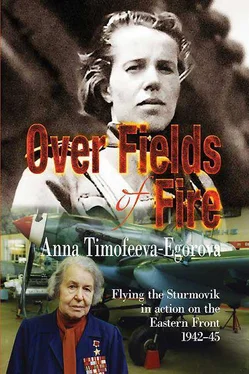In the flying club we studied flight theory, aerial navigation and meteorology, the ‘Flight Operations Manual’ and the equipment of the U-2 plane. By the springtime we had begun to go with an instructor to an aerodrome in Malye Vyazemy for aerial training. We would get on a steam train (there were no electric trains back then) at the Byelorusskiy train station and it would take us an hour and a half to get to Vyazemy. From there it was a kilometre’s walk to the aerodrome through the woods along the Vyazemka river.
Our aerodrome! It was already waiting for us beyond the village of Malye Vyazemy where there was a large field surrounded by woods. Hangars, offices and residential quarters had been built there — and all by the hands of the Metrostroy students. We, the students, prepared ourselves for flying with a help of a small book in a blue cover. It was titled “VVS RKKA 26 26 Translator’s note — Russian abbreviation for the Air Force of the Workers’ and Peasants’ Red Army.
Flight Training Course”, or simply KULP. It was sternly drilled into us that this book had been written in the blood of flyers. It contained directions for the flight student for studying and mastering flying skills, and “general advice”.
Let’s take, for example, clause 5: “Cultivate in yourself military discipline both on the ground and in the air, orderliness, politeness at work and in private life, constant attention even to small details, accuracy, punctuality, swiftness in action, and especially boldness within reason when resolving of a given problem”. Very practical advice!
Back then we learned the pages of this book, remarkable from any point of view, almost by heart. Here if you please is another of its clauses: “Don’t lose courage after temporary failures: on the contrary, after failures you have to show still more perseverance, persistence and will, to work still more to overcome difficulties, you should not become presumptuous in case of success, nor allow yourself to slacken your attention, fall into laxity or ridicule your comrades. You should remember that during summer practice a serious and prudent approach to each sortie and exercise regardless of his personal qualities, flying skills and record, is required of every pilot. Infringement of this rule will inevitably eventuate in a breakdown or an accident, observance guarantees stable accident-free high-quality work”.
We would re-read the pages of the KULP dozens of times before a flight, before implementation of another exercise, during preparation for exams. We also studied the ‘Flight Operations Manual’, the FOM. At the aerodrome first of all we took an examination before a mechanic on knowledge of the aircraft and the engine. Then, setting the plane up on a pivot post, we in turn entered the rear cockpit (an instructor sat in the front one) and, manipulating the levers, learned how to take off, turn around, and land on three points. An instructor patiently showed us how to work out the level for different flight configurations. To do this we would now lift the plane’s tail, now lower it, now move it sideways.
At long last all the tests had been passed, the ground-based preparation had been completed and the next Sunday we should be flying. How slowly time drags when you are waiting… By now I was working at the shaft again — as a caulker. We caulked the tubing seals (this was to damp-proof the tunnels). It was really hard to caulk the arch of the tunnel — my arms raised up with a caulking hammer grew tired. On top of that when you do this work water pours from above directly into your sleeves and flows down all over your body, so you stand as if under a heavy shower of rain. When you are caulking the floor of the tunnel other difficulties arise. After a lot of preparation work done with a beading puncher you have to fill the seams with lead and tamp grout on top. Our work was considered unhealthy and a girl from the canteen would constantly bring us milk straight to the workplace and make us drink as much as we could! My duty was to prepare grout from cement, liquid glass, sand and other components according to the set proportions and fill the tubing seams with it. It was not a complicated job but it was difficult to do in gloves. Then I took them off and began to stuff the grout between the rough pig-iron tubing walls with my bare hands.
After the shift I washed my hands and looked at them: there was no skin on them, and they hurt terribly: “What about flying?” An anxious thought flashed through my mind. I ran to the medical unit and the doctor gave a gasp, “What have you done, you silly girl?”
“Will they skin over by Sunday?” I asked. “I have to go flying, you see.”
“What do you mean, go flying!?” The doctor growled, smearing something on my hands and binding them up. She gave me a sick-leave certificate and forbade me to take off the dressings or wet my hands.
On the second day I nevertheless went to work but I couldn’t stuff grout into the seams even with gloves on. Then I began carrying cement and sand in buckets. Trying to protect my sore palms, I would take the bucket like a ladies’ handbag and carry it on my bent arm. Passing by with yet another bucket of cement I suddenly heard yelling. Blokes from the tunnelling crews were arguing. There was a lot of noise anyway — from rock breakers, from caulking hammers driven by compressed air, from hissing hoses, from trolleys. But the blokes were outshouting all the workplace noise.
“Anya! Anya!” I heard them calling me. “tell us which is right: opéra or òpera?”
Two huge blokes stood in front of me, with faces red from arguing, gripping colossal spanners in their hands. Just in case I stood between them and said in a conciliatory manner “In French it would be opéra but in Russian, òpera.”
The blokes calmed down, sympathized with me because my hands were in dressings and one of them asked “Why do we never see you at dances?”
“No time, I’m studying at our aeroclub’s flying school.”
“Have you already flown?” The miners asked with one voice.
“Of course”, I lied, blushed and, hanging the bucket on my arm strode to my workplace.
“What’s wrong with your hands, Egorova? Why are you carrying the cement bucket on your hip and not in your hand?” the shift boss asked, coming towards me.
“It’s comfortable like that.” I answered and quickened my pace. At the beginning of the shift the brigade foreman had tried to ban me from working but I convinced him I would be assisting the brigade to meet the plan, and stayed.
By the end of the second piatidnevka 27 27 Translator’s note — a five day period — in the 1930s in the USSR the normal seven-day week was replaced by a five-day week.
my hands had skinned over and I immediately headed to the aeroclub. Now we had to go to the aerodrome on a daily basis. The shaft was operating well but when I requested a transfer to work only day-shifts, for I would have to fly every day, our foreman Zaloev objected, “I won’t let you! You have no right!”
The Ossetian 28 28 Translator’s note — a national group in the Northern Caucasus.
Zaloev was handsome. His eyes, black with dark blue, flashed with fires from under long bushy eyelashes, his eyebrows were like two wings, his curly hair poked out from under his miner’s hat. He was tall and well-built. His ugly work clothes seemed to suit him! I was watching him carefully and he was running back and forth around the site brandishing his caulking hammer. “Here we go”, I thought. “With his hot Caucasus blood what a whack he’s gonna give me with the hammer!” but Zaloev, having calmed down, said reconciliatory “You no be angry ata me, me wanta good for you. Drop outta you flying, you may losa you head. Once we builda the station you willa join any institute you wanna. But now, Anya, you musta work.”
Читать дальше












